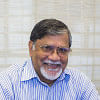
Ahrar Ahmad
Dr Ahrar Ahmad is professor emeritus at Black Hills State University in the US, and director general of Gyantapas Abdur Razzaq Foundation in Dhaka.
Dr Ahrar Ahmad is professor emeritus at Black Hills State University in the US, and director general of Gyantapas Abdur Razzaq Foundation in Dhaka.
The cruelties of the genocide, and the heroism of the resistance were all parts of the people’s lived experience.
An incredible opportunity has been created to build a more democratic, just and beautiful Bangladesh.
Even though transparent, participatory and competitive elections are a constitutional right, the realities today have vitiated those expectations.
A great university inspires and prepares students for a rich and fulfilling experience in a changing and challenging world.
Shorn of its sacred grandeur the Padma has embraced its secularised and earthier image with some muscularity, audacity and flair.
What makes a good student? A definitive answer to this question is difficult.
Today, the question of being a 'good teacher' generates a new vernacular.
It is with profound sorrow we write this piece about our dear friend Imtiaz Hasan Habib (1949-2018), who died peacefully while asleep in the early morning hours of August 27 at his home in Norfolk, Virginia.
There are iconic pictures that sometimes capture an age, define a moment in history, exemplify beauty, tragedy, or joy, in ways otherwise impossible to evoke. Who can forget the naked, screaming Vietnamese girl fleeing the napalm attack on her village in 1972; the Chinese man standing in lonely defiance in front of a column of tanks at the Tiananmen Square in 1989; the Times Square kiss; or the raising of the US flag at Iwo Jima, heralding the end of WWII?
Being married to Begum Sufia Kamal was certainly an important part of Mr Kamaluddin Ahmed Khan's life. He derived much joy and meaning, and perhaps some recognition, from this. But he never derived his identity from this relationship. In that, he was fiercely independent, and quite unique.
It has neither been possible, nor even desirable, for me to write about 1971. The reasons are fairly simple. First, while my engagement in the war was early and sincere, my actual contribution to it was rather flimsy and dull.
While we all occupy multiple identities in our lives, some stand out more sharply, and are more cherished, than others. For most of the people engaged in the Liberation War of 1971, it is that experience alone that perhaps defines them more than anything else.
It is awkward to write about a novel when one is not a literary critic. The task is all the more daunting, given that unlike Tahmima
Cities have always been important to Asia. As Charles Tilly remarks, “Cities emerged in Asia, and in terms of sheer man-years lived in cities, Asians have more urban experience than the rest of the world put together”.
John Kerry's visit accomplished pitifully little. Popular wisdom suggests that it symbolised much. Lacking both popularity and wisdom, I am not entirely convinced of that judgment.
Among the anxieties, fears and confusions generated by the grisly tragedy that occurred on July 1 at the Holey Artisan Bakery in Dhaka, one refrain was fairly consistent...
How can freedom of speech flourish when sensitivities are so high, and public patience so low, when dissent is considered dangerous, any critique is considered to be a challenge, and all opposition is viewed as an existential threat that must be crushed? How credible are the preachy platitudes about democracy coming from people who are not its best exemplar?